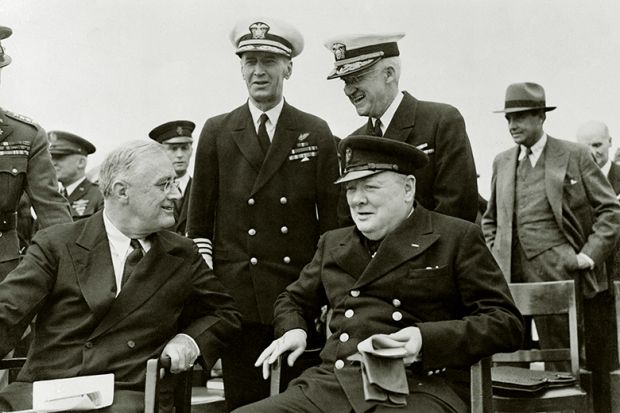The words “hegemon”, “hegemony” and “hegemonic” are to be found on most pages of this book, but if their ubiquity is at times wearisome, Kori Schake demonstrates that no near synonyms will do. Hegemony, she argues, is not mere dominance or supremacy: a truly hegemonic power is not just supreme, but has “the ability to set the rules of international involvement, and to create order amongst states by enforcing those rules”. The hegemonic power does not simply hold the high cards in the international poker game, it decides “what game the players are engaged in”.
The central thesis of this disturbing book is that history has seen a succession of hegemonies, but nearly all replacements of one hegemonic power by another have come about by violence as the fading hegemon contests with all its might the growing power of its successor. There is one exception, the replacement of British power by American, a transition that occurred from the early 19th century to the mid-20th, and which was uniquely peaceful. This was, the author claims, a highly contingent outcome, perhaps a fortuitous accident, brought about because at a crucial time “America became an empire and Britain a democracy”. The contingent nature or special circumstances of this transition make it highly unlikely that any challenge to the prevailing hegemony of the US will result in a similarly peaceful passage.
The transition from British to American hegemony was a long process, and it was not orchestrated or planned by either power. Schake’s view is that it can be charted by incremental steps that formed precedents and, over time, a pattern of choices that hardened into long-term policies. She takes us through the steps that she perceives as having led consecutively to a growing amity, a hegemonic alliance – and, eventually, the sidelining and then the destruction of British interests. A major question is why Britain at the beginning of this process, when it was strengthened by its success in the Napoleonic Wars and had close links to European states, accommodated and conciliated the far weaker America. There were several junctures at which the UK could have put paid to US ambitions and to what its demagogues christened its “manifest destiny”. In response to disputes over Canada’s borders, Britain could have utilised the overwhelming military strength that it enjoyed before mid-century, but instead it settled issues by diplomacy, while Lord Palmerston considered, but refrained from, a policy during the American Civil War that could have facilitated a Confederate victory and devastated America as a rising power.
Schake follows Paul Kennedy’s highly influential book The Rise and Fall of the Great Powers (1988) in seeing British foreign policy as in essence accommodative to America’s rise to great power status, suggesting that British statesmen lacked confidence in the durability of British power and, conscious of the dangers of stretching beyond its national resources, knew that past successes had usually been accomplished in alliance with other powers. This led to policies of pragmatism and caution, with Britain, rather than restraining America’s desire to expand at the expense of the colonial powers and their successor states on the American continent, enabling that expansion by providing the protection of the Royal Navy. Britain, it could be said, was managing decline long before decline began.
The central argument in Safe Passage, however, is that in the late 19th century, sympathies between the UK and the US increased; their policies became aligned for positive reasons as similarities between the powers increased. America became an imperial power in all but name, both within and, with the acquisition of Hawaii and the Philippines, beyond the American continent, while Britain, with its widening electorate, became more democratic. Rough edges remained in the tacit alliance, but a view of common interests largely prevailed and was strong enough to survive tests such as the two Venezuelan crises, although not strong enough to bring America into the First World War until late in the day.
The end of the First World War marked the triumph of a joint Anglo-American hegemony, but also intimated at its eventual end. After the post-war settlement, Schake writes, “Woodrow Wilson was unable to convince Americans that the world needed their continued involvement, but he had found the key that would underpin future American hegemony, remaking the international order into a values-drenched simulacrum of the United States”. That would have to wait until 1945, when America, “at the zenith of its power, attempted to recreate international relations by projecting as universal its domestic political values”. Britain, with its wealth dissipated by two wars and heavily in debt to an America engaged in remaking the world in a glorified version of its own image, found itself forced to abandon first the imperial free trade area and gradually most of its empire – and the hegemony of America began.
For Britain, the period of dual hegemony had not been without advantages. It probably prolonged British power and influence and ensured the defeat in two wars of its formidable European rival and its own survival. After its end, the discarded partner could still take reassurance from its place in Nato and seek comfort from the afterglow of a “special relationship”, so emotionally nurtured by Churchill (pictured, with Roosevelt). Nevertheless, Palmerston’s view that Britain has “no permanent friends, only permanent interests” seemed to have been borne out.
Schake ends her account of the transition from British to American hegemony with the end of the Second World War, but whether America was at the zenith of its power in 1945 is debatable. It had certainly displaced Britain as the leading power in the Western world, but it faced both a military and an ideological challenge from a putative hegemon, the Soviet Union. The absence of discussion of the Cold War makes for a hiatus between the end of Anglo-American hegemony and the excellent final chapter, which discusses a possible challenge to America’s position from a new potential hegemon, China.
Arguably, the real zenith of American hegemony came with the implosion of the Soviet Bloc and the Soviet Union itself in 1989‑91. Francis Fukuyama’s The End of History and the Last Man (1992) may well have been misunderstood, but it was popularly interpreted as signalling the beginning of an era in which the American liberal-democratic world order would no longer be seriously challenged. It is the subsequent failure of this irenic scenario – as an America, too confident in the appeal of its power and values, indulged in strategic and ideological overreach – that provides the context for Schake’s concluding chapter. Here, she argues that a Chinese hegemony would seek to change the rules of the game and impose its own domestic model on the world, just as America did. Without “an ideology able to appeal to America in the seductive way America’s ideology appealed to Britain, any hegemonic transition will require imposition by force”. There will be no second “safe passage”.
This is a brilliant book, which uses a well-researched historical study as the context for a discussion of the international order of the present.
A. W. Purdue is a visiting professor of history at Northumbria University and the author of one-volume histories of the First and the Second World Wars.
Safe Passage: The Transition from British to American Hegemony
By Kori Schake
Harvard University Press
400pp, £23.95
ISBN 9780674975071
Published 24 November 2017

The author
Kori Schake, who has just taken up a position as deputy director-general of the International Institute for Strategic Studies in London, was born in Sonoma, California, “not far from where gold was discovered in 1848”. Undergraduate study at Stanford University gave her “a broad liberal arts education” and also “the chance to be a student of [Condoleezza] Rice [US secretary of state, 2005-09], which is how I came to have an interest in national security issues”.
This led to a career in both academia and public service. While still a PhD student at the University of Maryland, Schake secured an American Association for the Advancement of Science fellowship, and work in the joint staff of Colin Powell (who later served as secretary of state). There, she recalls, she “was having such fun and learning so much that I stayed in the Pentagon six years”. After gaining her PhD, she taught at Maryland and Johns Hopkins University.
After 9/11, Schake was recruited to the National Security Council as director for defence strategy and requirements before returning to teaching, at the United States Military Academy at West Point. For the past decade, she has worked as a research fellow at Stanford’s Hoover Institution, with time off to be deputy director of policy planning in the State Department and senior policy adviser on John McCain’s 2008 presidential campaign.
Asked what the study of history brings to practical politics, Schake says “policymakers have so many issues to work on that they can’t know nearly enough about most of them. That makes historical analogies the currency of shaping their understanding – no one wants to be [President Johnson] with Vietnam; everyone wants to be [President Kennedy] during the Cuban Missile Crisis…History helps avoid previous mistakes, shapes your understanding of the major dynamics of a problem, helps test whether potential solutions can get traction in any given environment.”
Matthew Reisz
POSTSCRIPT:
Print headline: When Britannia waived its rule
Register to continue
Why register?
- Registration is free and only takes a moment
- Once registered, you can read 3 articles a month
- Sign up for our newsletter
Subscribe
Or subscribe for unlimited access to:
- Unlimited access to news, views, insights & reviews
- Digital editions
- Digital access to THE’s university and college rankings analysis
Already registered or a current subscriber? Login







